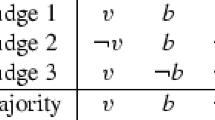Abstract
In response to recent work on the aggregation of individual judgments on logically connected propositions into collective judgments, it is often asked whether judgment aggregation is a special case of Arrowian preference aggregation. We argue for the converse claim. After proving two impossibility theorems on judgment aggregation (using “systematicity” and “independence” conditions, respectively), we construct an embedding of preference aggregation into judgment aggregation and prove Arrow’s theorem (stated for strict preferences) as a corollary of our second result. Although we thereby provide a new proof of Arrow’s theorem, our main aim is to identify the analogue of Arrow’s theorem in judgment aggregation, to clarify the relation between judgment and preference aggregation, and to illustrate the generality of the judgment aggregation model.
Similar content being viewed by others
References
Bovens L, Rabinowicz W (2006) Democratic answers to complex questions: an epistemic perspective. Synthese 150(1):131–153
Dietrich F (2006) Judgment aggregation: (Im)possibility theorems. J Econ Theory 126(1):286–298
Dietrich F (forthcoming) A generalized model of judgment aggregation. Soc Choice and Welfare
Dietrich F, List C (2005) Judgment aggregation by quota rules. Working paper, LSE
Dokow E, Holzman R (2005) Aggregation of binary evaluations. Working paper, Technion Israel Institute of Technology
Gärdenfors P (forthcoming) An Arrow-like theorem for voting with logical consequences. Econ Philos
Guilbaud GT (1966) Theories of the general interest, and the logical problem of aggregation. In: Lazarsfeld PF, Henry NW (eds) Readings in mathematical social science. MIT Press, Cambridge, pp 262–307
van Hees M (forthcoming) The limits of epistemic democracy. Soc Choice Welfare
List C (2003) A possibility theorem on aggregation over multiple interconnected propositions. Math Soc Sci 45(1):1–13
List C (2004) A model of path dependence in decisions over multiple propositions. Am Polit Sci Rev 98(3):495–513
List C (2005) The probability of inconsistencies in complex collective decisions. Soc Choice Welfare 24:3–32
List C, Pettit P (2001/2004) Aggregating sets of judgments: two impossibility results compared. Social and Political Theory Paper W20 (technical report ID 931), Australian National published in Synthese 140(1–2):207–235
List C, Pettit P (2002) Aggregating sets of judgments: an impossibility result. Econ Philos 18:89–110
Nehring K (2003) Arrow’s theorem as a corollary. Econ Lett 80:379–382
Nehring K, Puppe C (2002) Strategy proof social choice on single-peaked domains: possibility, impossibility and the space between. Working paper, University of California, Davis
Nehring K, Puppe C (2005) Consistent judgment aggregation: a characterization. Working paper, University of Karlsruhe
Pauly M, van Hees M (2006) Logical constraints on judgment aggregation. J Philos Logic 35:569–585
Pettit P (2001) Deliberative democracy and the discursive dilemma. Philos Issues 11:268–299
Pigozzi G (forthcoming) Belief merging and the discursive dilemma: an argument-based account to paradoxes of judgment aggregation. Synthese
Wilson R (1975) On the theory of aggregation. J Econ Theory 10:89–99
Author information
Authors and Affiliations
Corresponding author
Rights and permissions
About this article
Cite this article
Dietrich, F., List, C. Arrow’s theorem in judgment aggregation. Soc Choice Welfare 29, 19–33 (2007). https://doi.org/10.1007/s00355-006-0196-x
Received:
Accepted:
Published:
Issue Date:
DOI: https://doi.org/10.1007/s00355-006-0196-x




